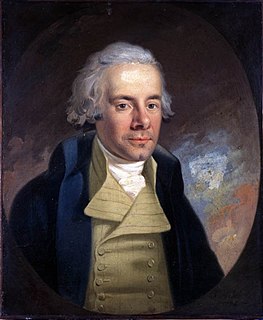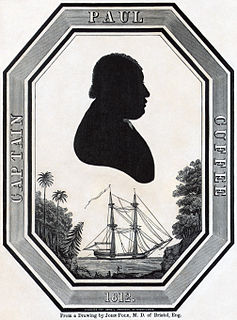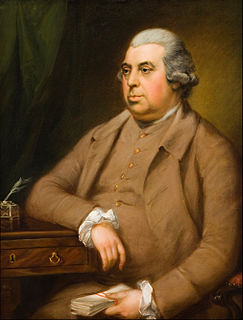Related Research Articles

William Wilberforce was a British politician, philanthropist and leader of the movement to abolish the slave trade. A native of Kingston upon Hull, Yorkshire, he began his political career in 1780, eventually becoming an independent Member of Parliament (MP) for Yorkshire (1784–1812). In 1785, he became an evangelical Christian, which resulted in major changes to his lifestyle and a lifelong concern for reform.
The Clapham Sect, or Clapham Saints, were a group of social reformers associated with Clapham in the period from the 1780s to the 1840s. Despite the label "sect", most members remained in the "established" Church of England, which was highly interwoven with offices of state. Its successors were in many cases outside of the same church affiliation.

A missionary is a member of a religious group which is sent into an area in order to promote its faith or provide services to people, such as education, literacy, social justice, health care, and economic development.
Robert Haldane was a religious writer and Scottish theologian. Author of Commentaire sur l'Épître aux Romains, On the Inspiration of Scripture and Exposition of the Epistle to the Romans.

Clapham Common is a large triangular urban park in Clapham, south London, England. Originally common land for the parishes of Battersea and Clapham, it was converted to parkland under the terms of the Metropolitan Commons Act 1878. It is 220 acres of green space, with three ponds and a Victorian bandstand. It is overlooked by large Georgian and Victorian mansions and nearby Clapham Old Town.

Henry Thornton was an English economist, banker, philanthropist and parliamentarian.

Zachary Macaulay was a Scottish statistician and abolitionist who was a founder of London University and of the Society for the Suppression of Vice, and a Governor of British Sierra Leone.

The Merina people are the largest ethnic group in Madagascar. They are the "highlander" Malagasy ethnic group of the African island and one of the country's eighteen official ethnic groups. Their origins are mixed, predominantly with Austronesians arriving before the 5th century AD, then many centuries later with Arabs, Africans and other ethnic groups. They speak the Merina dialect of the official Malagasy language of Madagascar.

Paul Cuffe, also known as Paul Cuffee was an American businessman, whaler and abolitionist. Born free into a multiracial family on Cuttyhunk Island, Massachusetts, Cuffe became a successful merchant and sea captain. His mother, Ruth Moses, was a Wampanoag from Harwich, Cape Cod and his father an Ashanti captured as a child in West Africa and sold into slavery in Newport about 1720. In the mid-1740s, his father was manumitted by his Quaker owner, John Slocum. His parents married in 1747 in Dartmouth.
The Church Mission Society (CMS), formerly known as the Church Missionary Society, is a British mission society working with the Christians around the world. Founded in 1799, CMS has attracted over nine thousand men and women to serve as mission partners during its 200-year history. The society has also given its name "CMS" to a number of daughter organisations around the world, including Australia and New Zealand, which have now become independent.

John Thornton (1720–1790) was a British merchant and Christian philanthropist who became immensely wealthy through investment in the North Sea Russia trade, and as a result of his Christian faith, gave much of his money away to a huge number of good causes, in so doing becoming the greatest philanthropist of the eighteenth century. Hugely successful in business, it was said that at the time of his death in 1790, Thornton had become the second most wealthy man in Europe.

Charles Grant was a British politician influential in Indian and domestic affairs who, motivated by his evangelical Christianity, championed the causes of social reform and Christian mission, particularly in India. He served as Chairman of the British East India Company, and as a member of parliament (MP), and was an energetic member of the Clapham Sect. The "Clapham Sect" were a group of social activists who spoke out about the moral imperative to end slavery. Henry Thornton founder of the Clapham sect regarded Grant as his closest friend, after Wilberforce, and Grant planned and paid for a house called 'Glenelg' on Henry's estate in Battersea. It was a twin to, and lay near to the house built on the same estate for Wilberforce after his marriage, the location of which is marked by a plaque at No.111 Broomwood Road, west of that section of Battersea Rise now called Clapham Common West Side. Grant later moved to live in Russell Square.

John Sirgood (1821–1885) was a Christian fundamentalist lay preacher, shoemaker and draper.

Henry Venn was an Anglican clergyman who is recognised as one of the foremost Protestant missions strategists of the nineteenth century. He was an outstanding administrator who served as honorary secretary of the Church Missionary Society from 1841 to 1873. He was also a campaigner, in the tradition of the Clapham Sect, who frequently lobbied the British Parliament on social issues of his day, notably on ensuring the total eradication of the Atlantic slave trade by retaining the West African Squadron of the Royal Navy. He expounded the basic principles of indigenous Christian missions: these were much later made widespread by the Lausanne Congress of 1974.
Intercontinental Church Society (ICS) is a global Anglican mission organisation. ICS is a voluntary Evangelical Society, a full member of the Partnership for World Mission, and therefore a recognized agency of the Church of England for overseas work through the medium of the English language. It supports ministry to people from all over the world and calls on people at home for prayer and financial support. Their current mission statement is "mission and ministry in English for everyone."

The Universities' Mission to Central Africa was a missionary society established by members of the Anglican Church within the universities of Oxford, Cambridge, Durham, and Dublin. It was firmly in the Anglo-Catholic tradition of the Church, and the first to devolve authority to a bishop in the field rather than to a home committee. Founded in response to a plea by David Livingstone, the society established the mission stations that grew to be the bishoprics of Zanzibar and Nyasaland, and pioneered the training of black African priests.
The plan of raising a fencible corps in the Highlands was first proposed and carried into effect by William Pitt the Elder, in the year 1759. During the three preceding years both the fleets and armies of Great Britain had suffered reverses, and it was thought that a "home guard" was necessary as a bulwark against invasion.
John Venn was a priest of the Church of England who was a central figure of the group of religious philanthropists known as the Clapham Sect.
Adams College is a historic Christian mission school in South Africa, associated with the United Congregational Church of Southern Africa (UCCSA). It was founded in 1853 at Amanzimtoti a settlement just over 20 miles (32 km) south of Durban by an American missionary. The settlement there is known as Adams Mission. The college's alumni include Presidents of Botswana and Uganda, several ministers and leaders of the African National Congress. It is recognised as a historic school. It has been called Adams School, Amanzimtoti Institute and the Amanzimtoti Zulu Training School.

The zenana missions were outreach programmes established in British India with the aim of converting women to Christianity. From the mid 19th century, they sent female missionaries into the homes of Indian women, including the private areas of houses - known as zenana - that male visitors were not allowed to see. Gradually these missions expanded from purely evangelical work to providing medical and education services. Hospitals and schools established by these missions are still active, making the zenana missions an important part of the history of Christianity in India.
References
- ↑ Mouser, Bruce (2004). "African academy 1799-1806". History of Education. 33 (1).
- ↑ Killingray, David (2014). "Godly Examples and Christian Agents". In Stanley, Brian; Becker, Judith (eds.). Europe as the Other: External Perspectives on European Christianity. Vandenhoeck & Ruprecht. pp. 165–196.
- 1 2 Phillip, Rodert (1841). The life, times, and missionary enterprises of the Rev. John Campbell. London: Snow. pp. 160–1. Retrieved 15 February 2016.